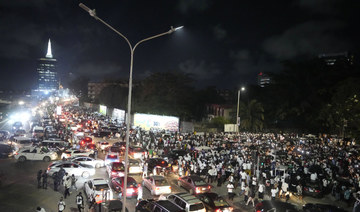KANO, Nigeria: Gunmen have kidnapped more than 30 people, including at least 24 female students, in a raid in and around a university in northwest Nigeria’s Zamfara state, residents said Saturday.
Dozens of gunmen from criminal gangs called bandits stormed Sabon Gida village on the edge of a Federal University outside the state capital Gusau in a predawn attack on Friday breaking into three female hostels and taking away the occupants, residents told AFP.
The attack was the first mass kidnapping at a college since President Bola Ahmed Tinubu came to power, promising to tackle the country’s security challenges.
“The bandits rode into the village on motorcycles and broke into the hostels and gained access into rooms by bringing down the windows,” Sabon Gida resident Sahabi Musa said.
“They took away at least 24 female students from the hostels along with two male neighbors, one of whom is a staff (member) of the university,” said Musa, who lives close to the hostels.
The attackers went into the university and seized nine welders working on a new building while they were sleeping, said Shehu Hashimu, another resident who corroborated Musa’s account.
One of the welders managed to escape and returned to the school, Hashimu said.
Troops deployed from Gusau, 20 kilometers away and engaged the attackers in a gunfight but a group of the kidnappers herded the hostages away while another group faced the soldiers, the two sources said.
“The attackers had a field day. They operated in the village from 3:00 am to 6:00 am unchallenged before troops arrived,” Hashimu said.
A video shared online after the assault showed ransacked rooms in one of the hostels with their windows pulled down.
Yazid Abubakar, Zamfara state police spokesman, confirmed the attack but declined to provide details, saying security personnel were working to free the captives.
A military officer said a military operation was under way as soldiers were confronting the attackers in a forest close to the nearby town of Tsafe.
“Six of the female students have been rescued by troops who pursued the terrorists into the forest,” said the officer, who asked not to be identified because he was not authorized to speak on the operation.
Zamfara is one of several states in northwestern and central Nigeria terrorized by bandits who raid villages, kill and abduct residents as well as burn homes after looting them.
The gangs maintain camps in a huge forest straddling Zamfara, Katsina, Kaduna and Niger states.
The criminals have been notorious for mass kidnappings of students from schools in recent years.
In February 2021, bandits raided a girl’s boarding school in the town of Jangebe in Zamfara state, kidnapping more than 300 students.
The girls were freed days later following a ransom payment by the authorities.
Nigeria is facing a myriad of security challenges, including a 14-year militant insurgency in the northeast that has killed at least 40,000 people and forced more than two million others to flee their homes.
Gunmen kidnap dozens in Nigerian university: Sources
https://arab.news/g3zfk
Gunmen kidnap dozens in Nigerian university: Sources

- Dozens of gunmen from criminal gangs called bandits stormed Sabon Gida village on the edge of a Federal University
- They took away at least 24 female students from the hostels along with two male neighbors, one of whom is a staff (member) of the university
At least three dead as migrant boat capsizes off Greek island

- An accident occurred when the vessel approached the migrants’ wooden boat
- The search for survivors was continuing with four patrol boats
ATHENS: The bodies of three migrants were picked up in waters off the Greek island of Crete during a rescue effort involving a commercial ship, authorities said Friday.
Twenty migrants were rescued by the commercial vessel which was directed to the area on the orders of the Greek Search and Rescue Center.
According to Greek public broadcaster ERT, an accident occurred when the vessel approached the migrants’ wooden boat. As the passengers tried to climb up ladders into the vessel a sudden movement caused the small boat to capsize.
The search for survivors was continuing with four patrol boats, an aircraft, and two ships from the European border agency Frontex, a spokesperson for the Greek coast guard told AFP.
According to ERT, survivors said about 50 people were aboard the wooden boat.
A second boat carrying around forty migrants was spotted in the area, triggering another rescue operation.
For over a year, migrants have been attempting the perilous crossing from Libya to Crete, the gateway to the European Union.
According to the UN High Commissioner for Refugees (UNHCR), more than 16,770 people seeking asylum in the EU arrived in Crete in 2025.
Faced with the surge in arrivals, the conservative Greek government suspended the processing of asylum applications for three months last summer, particularly for those arriving from Libya.
UNHCR says 107 people died or went missing in Greek waters in 2025.














